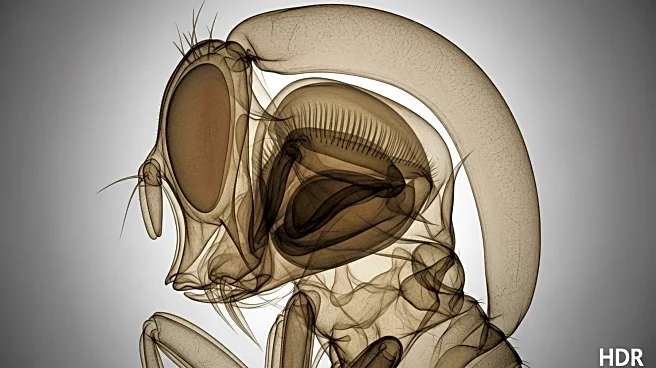What is the story about?
What's Happening?
Recent research has highlighted the significance of a tissue fold known as the cephalic furrow in the development of fruit fly embryos, specifically Drosophila melanogaster. This fold, forming between the head and trunk of the embryo, plays a crucial mechanical role in stabilizing embryonic tissues during development. Researchers from the Max Planck Institute of Molecular Cell Biology and Genetics in Dresden, Germany, have integrated computer simulations with experimental data to demonstrate that the timing and position of the cephalic furrow are vital for its function, preventing mechanical instabilities in embryonic tissues. The study suggests that mechanical forces, such as those exerted during tissue movements and cell divisions, may have influenced the evolution of this fold, providing a selective advantage by absorbing compressive stresses during gastrulation.
Why It's Important?
The findings underscore the impact of mechanical forces on the evolution of developmental features in organisms. By understanding how the cephalic furrow functions to stabilize embryonic tissues, researchers can gain insights into the broader mechanisms of morphogenesis, where mechanical forces shape tissues and organs during embryonic development. This research not only advances knowledge in evolutionary biology but also highlights the potential for mechanical forces to drive evolutionary innovations. The study provides empirical evidence that mechanical challenges during development can lead to genetic adaptations, influencing the evolution of new developmental features.
What's Next?
Further research may explore the genetic mechanisms underlying the formation of the cephalic furrow and its evolutionary significance across different species. Scientists might investigate how similar mechanical forces influence the development and evolution of other organisms, potentially leading to broader applications in biotechnology and bioengineering. Additionally, collaborations between experimentalists and theorists could refine models of embryonic development, enhancing our understanding of the interplay between genetics and mechanical forces in evolution.
Beyond the Headlines
The study opens up discussions on the ethical implications of manipulating mechanical forces in developmental biology and biotechnology. Understanding the role of mechanical forces in evolution could lead to advancements in genetic engineering, raising questions about the potential for artificially influencing evolutionary processes. This research also contributes to the cultural understanding of evolution, challenging traditional views by emphasizing the role of physical forces alongside genetic factors.















